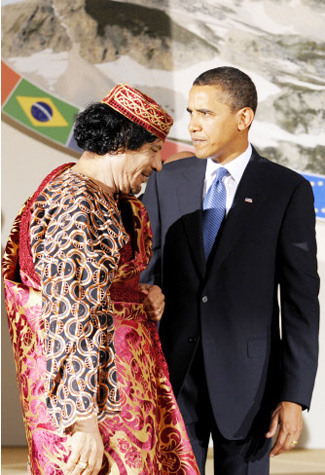Associated Press reports:
U.S. Defense Secretary Robert Gates said Sunday that the U.S. expects to turn control of the Libya military mission over to a coalition — probably headed either by the French and British or by NATO — “in a matter of days.”
In his first public remarks since the start of the bombings, Gates said President Barack Obama felt very strongly about limiting America’s role in the operation, adding that the president is “more aware than almost anybody of the stress on the military.”
“We agreed to use our unique capabilities and the breadth of those capabilities at the front of this process, and then we expected in a matter of days to be able to turn over the primary responsibility to others,” Gates told reporters traveling with him to Russia. “We will continue to support the coalition, we will be a member of the coalition, we will have a military role in the coalition, but we will not have the preeminent role.”
The two key possibilities, he said, are a combined British-French command or the use of a NATO command. He acknowledged there is “some sensitivity on the part of the Arab League to being seen to be operating under a NATO umbrella.”
The Guardian reports:
America, France and Britain – the leaders of the coalition’s air attacks on Libya – were struggling to maintain international support for their actions, as they faced stinging criticism about mission creep from the leader of the Arab League, as well as from China and Russia.
Critics claimed that the coalition of the willing may have been acting disproportionately and had come perilously close to making Gaddafi’s departure an explicit goal of UN policy.
Russia, which abstained on the UN vote last week, called for “an end to indiscriminate force”.
Despite denials from coalition forces, Alexander Lukashevich, Russia’s foreign ministry spokesman, said that the coalition had hit non-military targets.
He suggested that 48 civilians had been killed. “We believe a mandate given by the UN security council resolution – a controversial move in itself – should not be used to achieve goals outside its provisions, which only see measures necessary to protect civilian population,” he said.
The Arab League secretary general, Amr Moussa, also startled western governments when he denounced the air attacks only a week after the league had called for creation of a no-fly zone.
Moussa, who is a candidate for the Egyptian presidency, said: “What has happened in Libya differs from the goal of imposing a no-fly zone and what we want is the protection of civilians and not bombing other civilians.”
The Foreign Office later said Moussa claimed he had been misquoted, or had put his criticism more strongly in Arabic than in English. “We will continue to work with our Arab partners to enforce the resolution for the good of the Libyan people,” the FO said.
The Arab League had, though, been called to an emergency session to discuss the scale of the attacks.
The British defence secretary, Liam Fox, said the scale was in line with UN resolutions that had been “essential in terms of the Gaddafi regime’s ability to prosecute attacks on their own people”. He also said it was possible that Gaddafi himself could become a target of air attacks if the safety of civilians could be guaranteed.
Ahead of a Commons debate and vote tomorrow, leading figures in David Cameron’s cabinet were under pressure to clarify whether the explicit purpose of the attacks was to render Gaddafi’s regime so powerless that it collapses.
Speaking on the Politics Show, Fox said: “Mission accomplished would mean the Libyan people free to control their own destiny. This is very clear – the international community wants his regime to end and wants the Libyan people to control for themselves their own country.”
He then added: “Regime change is not an objective, but it may come about as a result of what is happening amongst the people of Libya.”
He said: “When the dynamic shifts and the equilibrium shifts, we will get a better idea just how much support the Gaddafi regime has and how much the people of Libya genuinely long to be able to control their own country.
“If Colonel Gaddafi went, not every eye would be wet.”
Fox said it was possible that allied forces might treat Gaddafi himself as a legitimate target for air strikes.
The New York Times reported:
Around 10 p.m. Sunday, a column of white smoke rose near Colonel Qaddafi’s compound in Tripoli, accompanied by a loud explosion, suggesting that either his residence or the barracks of his personal guard had become a target for the allied barrage. The compound already contains a damaged building known as the “House of Resistance” that was preserved along with a statue as a monument to a failed American bombing attack on the compound more than 20 years ago. The sounds of sirens and sporadic gunfire followed.
Asked about the explosion, Vice Adm. William Gortney told a news conference in Washington that the United States was not on a mission to kill the Libyan leader. “At this particular point, I can guarantee that he’s not on a targeting list,” he said. But he added: “If he happens to be in a place, if he’s inspecting a surface-to-air missile site, and we don’t have any idea if he’s there or not, then —” He was interrupted by another question, and then said, “No, we’re not targeting his residence.”
The key phrase being: “at this particular point…”
Meanwhile, Chris McGreal describes the fate of some of the first victims of allied attacks on Gaddafi’s forces near Benghazi:
The dozen or so men clustered behind the last smouldering tank looked as if they had died while they slept.
Their blankets bore no burn marks so perhaps it was the force of blasts – powerful enough to rip the turrets off the Russian-made tanks and toss them 20 metres or more across the open field near Benghazi – that killed Muammar Gaddafi’s soldiers.
The air attack came at 4am , after the tanks pulled back from a day-long assault on the rebel stronghold of Benghazi. The crews chose to rest in a field about 10 miles from the de facto capital of the anti-Gaddafi revolutionaries.
It must have seemed safe to the soldiers. The rebels were far away and the tank crews would have seen any threat approaching by road. They gathered to eat and sleep behind the tank furthest into the field.
But it was no protection from the threat in the sky. The tanks and their operators were sitting ducks in the open and probably never heard the planes. The French pilots did not even have to be concerned about the risk of harming civilians.
Within moments, three of the four tanks in the field were shells.
What was not immediately incinerated was mangled, thrown into the sky and dumped in bits on the earth. Machine guns twisted into grotesque shapes, broken engine parts and flattened shells lay among the wreckage.
Four hours later, two of the tanks were still smouldering. A flatbed lorry used to haul them to the edge of Benghazi was on fire. A handful of pickup trucks, one carrying tins of food for the troops, had been burned out. Scavengers were picking over the corpses of Gaddafi’s dead soldiers.
Wreckage was strewn in similar scenes along nearly 15 miles of road beyond Benghazi, the result of air strikes on targets across the country that turned the struggle between Gaddafi and Libya’s revolutionaries on its head in a moment.
The barrage of attacks led by France, Britain and the US on Libya’s army, air bases and other military targets drew threats of a prolonged war from Gaddafi himself. But on the ground many of his forces were in disarray and fleeing in fear of further attacks from a new and unseen enemy.
The air assault halted and then reversed the advances by Gaddafi’s army on Benghazi and other rebel-held towns. But the revolutionary leadership wanted more. On Sunday it appealed for an intensification of the air assault to destroy the Libyan ruler’s forces and open the way for the rebels to drive him from power.
Issandr El Amrani has a shot at looking further down the road and poses five questions few are asking about Libya:
Not to rain on anyone’s parade, but while I’m glad that the multinational intervention is giving cover to Libyan insurgents, I’m rather shocked at the desultory coverage of what might come out of the military intervention. A tragedy has been taking place in Libya, whose people deserve help, but that doesn’t mean not thinking through consequences. Here’s a shot at it:
1. UNSC Resolution 1973 isn’t really about getting a ceasefire, is it?
Not really. Even if Qadhafi were to produce a real ceasefire, which is unlikely, the rebels would not observe it: they would keep trying to topple the regime. This resolution, under the guise of obtaining a ceasefire, seeks to carry out regime change. It would get even more complicated as the Libyan government headed by Qadhafi remains legitimate under international law, and thus can be argued to have law enforcement duties to implement against armed insurgents. This resolution is not just about preventing a massacre of civilians, it’s about taking sides. The Qadhafi regime is over as far as the international community is concerned, and mission creep will ensure that things will swiftly move from imposing a no-fly zone to more direct efforts, including ground missions. This might be good for the insurgents, might split them, and might not be so good for the countries leading the intervention. Time will tell.
2. But what if Qadhafi hangs in there, and there’s a stalemate?
Well, prolonged civil war happens. But it’s not clear whether this is a likely outcome, particularly if there are such stringent sanctions and travel restrictions on regime officials. There could a “liberated zone” and a Qadhafi-controlled zone for a while, with ongoing skirmishes. Western and Arab supplies of weapons to the insurgents would likely increase (Egypt is already supplying them). Although the insurgents have insisted on a united Libya, the fact is that historically there is strong regionalism in the country. A split could perdure, backed by both the regime’s control through force and genuine tribal support in its favor. The international community could be moved to escalate the mission to make it officially regime change, or push other actors (some would like that to be Egypt) to intervene directly. Some openly advocate for Egypt to invade Libya. I liked the idea of regional powers acting as regional policemen, but no one has asked Egypt whether it wants that role. It also has to think about thousands of Egyptians the regime might hold hostage there.



 If Sarkozy, Cameron and Obama believe that Gaddafi’s demonization makes the war legitimate in the eyes of domestic audiences which might otherwise lack interest in the fate of Libya, the West will have needlessly restricted the range of acceptable outcomes to this war.
If Sarkozy, Cameron and Obama believe that Gaddafi’s demonization makes the war legitimate in the eyes of domestic audiences which might otherwise lack interest in the fate of Libya, the West will have needlessly restricted the range of acceptable outcomes to this war. Mohammed Nabbous, founder of Libya AlHurra TV, killed this morning in Benghazi while reporting on Gaddafi forces attacks. Leaves behind wife and unborn baby.
Mohammed Nabbous, founder of Libya AlHurra TV, killed this morning in Benghazi while reporting on Gaddafi forces attacks. Leaves behind wife and unborn baby.